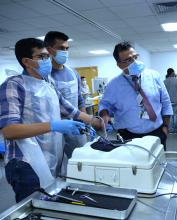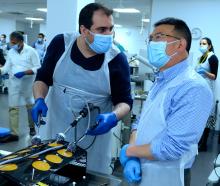Intermediate Skills for Laparoscopic Surgeons
This course has been approved by the Royal College of Surgeons of Edinburgh and has been awarded 18 CPD points.
A 3 day, practical course providing laboratory based practice of intermediate laparoscopic skills, aimed at surgical trainees (SPR) with some prior experience of laparoscopic cholecystectomy. The atmosphere is relaxed and informal, allowing easy exchange of ideas and experiences.
Level of Course: CT1-ST6
Course Director - Mr Samer Zino MD,MSc,MRes,MRCS,PhD(Gla),FRCS. Consultant UGI and Bariatric surgeon at Ninewells Hospital, Dundee, Scotland. Co-Director - Mr Benjie Tang, Senior Lecturer, Surgical Skills Centre.
The course provides;
- Maximum laboratory time to practise a wide range of intermediate to advanced laparoscopic skills
- Hands-on practical sessions on a variety laparoscopic procedures with animal tissue models
- Opportunity of using advanced surgical energy devices
- Expert Sessions to address a variety of topics in laparoscopic surgery
- Personal tuition and feedback
- Self paced and flexible programme
- Opportunity to view different applications
- Maximum of twenty participants
The course will cover (step-by-step demonstrations followed by hands-on sessions)
- Ergnonomics in laparoscopic surgery
- Difficult access techniques and adhesiolysis
- Advanced surgical energy devices and their safe application
- Laparoscopic suturing and intracorporeal knot tying
- Laparoscopic continuous suturing techniques
- Tumbled square knot
- Free laparoscopic suturing exercise
- Prevention of laparoscopic bile duct injuries
- Intraoperative cholangiography
- Primary closure of CBD or 'T' tube insertion
- Hiatial repair using tumbled square knot
- Repair of perforated duodenal ulcer
- Repair of incisional hernia
- Laparoscopic stapled Gastroenterostomy
Expert Sessions
- Ergonomic principles in laparoscopic surgery
- Difficult access techniques and indication for conversion to open
- Laparoscopic colorectal surgery
- Prevention of laparoscopic bile duct injury
- Laparoscopic intraoperative cholangiography
- Laparoscopic repair of perforated duodenal ulcer
- Laparoscopic stapled gastroenterostomy
- Total extra-peritoneal (TEP) hernia repair
- Laparoscopic incisional hernia repair
Learning Outcomes
At the end of this practical training course you should be able to:
- Explain the techniques necessary to overcome the visual demands in laparoscopic surgery
- Demonstrate effective equipment and instrument positioning using ergonomic principles
- Utilise exracorporeal knot-tying technique for ligation in continuity
- Demonstrate optimal bite placement and knot tying technique during laparoscopic tissue approximation
- Gain experience of safe use of advanced surgical energy device
- Demonstrate safe stapling technique
- Utilise protack fixation device safely
- Demonstrate safe and accurate handling mesh
Apply the component skills taught in this course to various procedures including:
- Access to scarred abdomen,
- Ligation in continuity using extracorporeal knot,
- Intraoperative cholangiography, primary closure of CBD or insertion 'T' tube
- Closure of enterotomy with competent laparoscopic suturing skills
- Hiatial repair
- Stapled gastroenterostomy
- Repair of perforated duodenal ulcer and
- Laparoscopic incisional hernia repair
- Total extra-peritoneal hernia repair
It is desirable that attendees have already completed a basic training course in laparoscopic surgery before applying for a place on this course.



